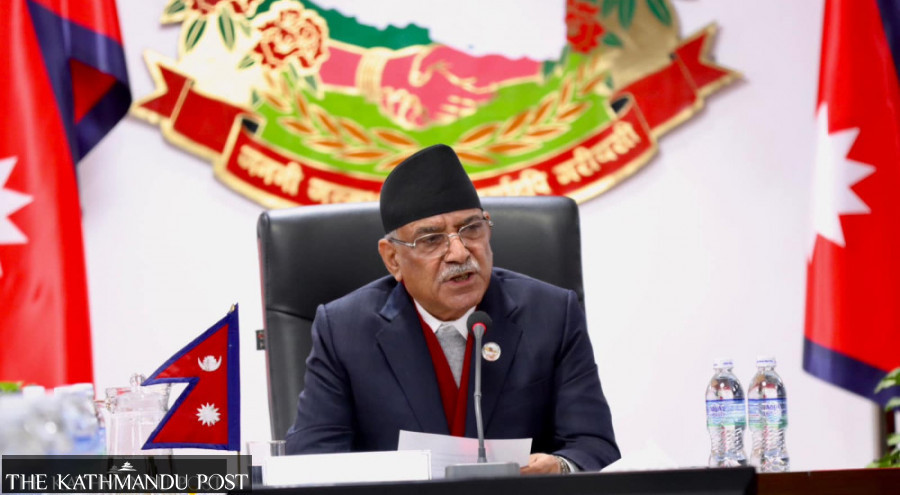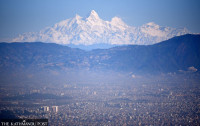Climate & Environment
Nepal to highlight climate effects at top UN summit
Aims to raise concerns including climate finance, loss and damage, adaptation, mountains’ agenda and mitigation at COP28 in the UAE.
Arjun Poudel
Nepal is working to draw the attention of world communities to the adverse impacts of climate change from which the country and its population have been affected the most.
Issues of climate finance, loss and damage, adaptation, impact on the Himalayas, mitigation, and inclusiveness, among others, will be the country’s agenda to be raised in the upcoming United Nations Climate Change Conference-COP28, officials said.
A high-level delegation led by Prime Minister Pushpa Kamal Dahal is scheduled to attend the event scheduled from November 30 to December 12 in the United Arab Emirates.
“We have prepared our agendas to be raised at COP28,” said Dr Buddhi Sagar Poudel, chief of the Climate Change Management Division of the Ministry of Forest and Environment. “We have also planned to hold a separate special session on the mountain agenda to draw the attention of world communities.”
Nepal has been bearing the brunt of climate change for the past several years. Mountains are melting, and glacial lakes have burst and vanished at record rates, leading to a loss of one-third of them in just three decades.
Monsoons, storms and landslides are growing in force and ferocity—sweeping away crops, livestock and entire villages—decimating economies and ruining lives.
Swift changes driven by a changing climate bring a new set of problems that directly affect lives and livelihoods. Over the years, mountain springs, which were the only source of water for the village, have started drying up and disappearing. Studies show close to 15 percent of the springs have dried up in some places and water flow has fallen as low as 70 percent elsewhere in the country.
The lack of water has not only affected the local supply, but also hit farming and animal husbandry. There was no option left for the villagers than to migrate.
Experts say that climate change has impacted multiple sectors—environment, agriculture, animal husbandry, drinking water, health, food security, hydropower, education, and women's empowerment.
Drying up of the streams and decreased flow of water caused by climate change threaten local communities, who depend on spring water for their lives and livelihoods. Water-related stress—low production of staple crops and fruits, dried-up green pastures and low adaptive capacity—have forced locals to contemplate migration.
“The issues Nepal is preparing to raise at COP28 will not be much different than the past, but we should clearly present our agenda,” said Raju Pandit Chhetri, a climate expert. “Issues to be raised by other countries will also be good, but our focus should be on implementation of past commitments and decisions.”
Despite negligible contribution to global emissions, Nepal has been facing catastrophic consequences. Mountainous areas like Manang and Mustang, where rainfall used to be quite low, have been witnessing unusual rainfall for the last several years. The drastic change witnessed in recent years has disturbed lives and livelihoods. Several other mountainous areas—Sindhupalchok and Solukhumbu—have witnessed catastrophic landslides and floods like never before in recent years.
Vector-borne diseases like dengue have started to emerge in the areas considered non-endemic in the past. Mental health problems have significantly risen in recent years, reportedly due to a rise in the stress level caused by the climate crisis.
Along with roads, bridges, and public properties, hydel projects (both in operation and under construction) sustained massive damages from floods and landslides. Hydropower is not only the main source of energy for the domestic market but is also a commodity with a huge export potential.
The changing climate’s impact on education has not yet been studied, but due to the rise in labour migration, the workload on women has increased and affected their health issues overall.
People residing in the remote mountainous areas of Nepal, those involved in agriculture, animal husbandry, and women and children have been affected much by the adverse impacts of climate change.
Climate experts in Nepal said along with rising agendas at global forums like COP28, the country must pay attention to implementing its international commitments and keep the issues of climate impacts at the centre, while making any policy.
“We have fulfilled some commitments—increase forest cover to 45 percent, boost the share of clean energy, and increase sales of e-vehicles among others,” said Manjit Dhakal, a climate expert. “But we have been laying multiple oil pipelines, which contradict our commitments.”
Nepal has made both short- and long-term strategies and policies to deal with the adverse impacts of climate change. But when it comes to implementing them, the approach has been lackadaisical. The impacts of climate change have affected multiple sectors and the daily lives of many people.
Experts say there is an urgent need to pay attention to the scale and omnipresence of the problems caused by climate change.
“Whatever the policies on mitigation and adaptation we made, their implementation is poor,” said Madhukar Upadhya, a climate expert. “People affected by floods and landslides years ago have not yet received the compensation.”
According to experts, authorities should make sincere efforts to implement strategies to address the climate impacts. Due to the apathy of the authorities concerned for mitigating adverse impacts and helping people to adapt, people from the affected areas have been migrating at an alarming pace.




 9.7°C Kathmandu
9.7°C Kathmandu










